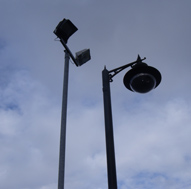The secret CCTV switch-off was the front page headline the other Saturday in The Independent. The story was that Tony Porter the Surveillance Camera Commissioner had told the CCTV User Group (rather discourteously, the newspaper didn’t acknowledge the Group) how councils were quietly turning off cameras. Not so much on the basis of the surveillance camera code of practice – only use cameras in cases of ‘pressing need’ – and still less to satisfy civil liberties campaigners, but to save money. The real news story to arise from the User Group conference, in my opinion, was (page 14) the tens of thousands – who can say how many – of local government cameras that councils don’t know they’ve got, or certainly aren’t properly monitored by control rooms. This after years of tighter budgets.
At least it shows that people are still interested in public space CCTV. And no wonder; it’s the glue that keep the management of town centres together, day and night; it helps catch shop thieves. And judging by the case studies at the User Group (from page 41) at least some councils, large and small, are still putting capital spending money into CCTV.
The Home Secretary Theresa May has taken to saying in speeches that under the Coalition, or put another way since Labour were ousted in 2010, crime has fallen by a quarter. At that rate, well within our lifetimes there will be no crime, and in that joyous new age there won’t be any need for private security, except perhaps to stand guard over the Crown Jewels and the like. We know however that police recorded crime figures are suspect. An official business crime survey (page 24) says much the same: crime has fallen, quite a lot. And it’s true; the crime that the survey covers has fallen … the statisticians haven’t got round to tallying online crime yet. Perhaps if they keep ignoring it, it’ll go away?! Except it’s only growing, judging by another, fairly official, survey, of information security breaches (page 25). What’s more sinister was Mrs May’s line in a recent speech to the Police Federation: “Reform over the next five years will mean working to understand and reduce demand on policing.” An easy way to reduce demand is to not answer the telephone; people will soon stop bothering to call the police, except in the worst emergency. Shops and businesses in general have learnt that already. Contrast the official lagging – let’s be charitable, and not suggest that the authorities are under-counting crime on purpose – with the way all sorts of people are embracing GIS to make better use of data (page 23). And even if the official crime figures wither to zero, businesses still need securing from the social engineers, the ‘people hackers’ (page 32).










